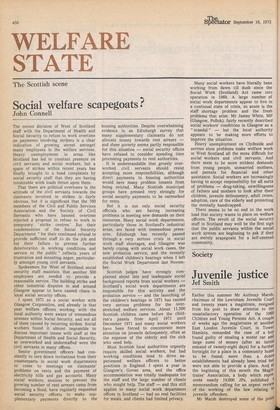The Scottish scene
Social welfare scapegoats?
John Connell
• The recent decision of West of Scotland staff with the Department of Health and Social Security to refuse to work overtime on payments involving strikers is a clear indication of growing unrest amongst many employees in the welfare services. Heavy unemployment in areas like Scotland has led to constant pressure on civil servants and social workers, but a spate of strikes within recent years has ' finally brought to a head complaints by social security staff that they are having intolerable work loads thrust upon them.
That there are political overtones in the attitude of the civil servants towards the claimants involved in strikes is fairly obvious, but it is significant that the 700 members of the Civil and Public Services Association and the Society of Civil Servants who have banned overtime rejected a proposal to refuse to work in temporary ' strike centres,' But their condemnation of the Social Security Department "for their continued refusal to provide sufficient staff to do the job and for their failure to prevent further deterioration in working conditions and service to the public " reflects years of frustration and mounting anger, particularly amongst young civil servants.
Spokesmen for West of Scotland social security staff maintain that another 500 employees are needed to provide a reasonable service. The building strike and other industrial disputes in and around Glasgow appear to have caused chaos in local social security offices.
I spent 1971 as a social worker with Glasgow Corporation, and already in that year welfare officers working with the local authority were aware of tremendous stresses within Social Security, and not all of them caused by recurring strikes. Social workers found it almost impossible to discuss important issues with staff at the Department of Health and Social Security, so overworked and understaffed were the civil servants in many offices.
Senior government officers had constantly to turn down invitations from their counterparts in social work departments to come to meetings on claimants' problems on rents and the payment of electricity bills and gas accounts. Many social workers, anxious to prevent the growing number of rent arrears cases from becoming a flood, have regularly requested social security officers to make supplementary payments directly to the housing authorities. Despite overwhelming evidence in an Edinburgh survey that many supplementary claimants do not allocate money towards rent arrears — and sheer poverty seems partly responsible for this situation — social security offices have refused to consider spending time processing payments to rent authorities.
It is understandable that grossly overworked civil servants should resist accepting more responsibilities, although direct payments to housing authorities would save many problem tenants from being evicted. Many Scottish municipal groups have pressed very strongly for social security payments to be earmarked for rents.
But it is not only social security officials who are having increasing problems in meeting new demands on their resources, Many social work departments, particularly those in Scotland's industrial areas, are faced with tremendous pressures. Edinburgh has recently passed through a very serious crisis in social work staff shortages, and Glasgow was barely coping with social work cases, the new probation service, and the recently established children's hearings when I left the Social Work Department last November.
Scottish judges have strongly complained about late and inadequate social background reports from social workers — Scotland's social work departments are responsible for this activity and the probation service — and the launching of the children's hearings in 1971 has caused very serious problems for the overstretched welfare services. About 11,500 Scottish children came before the children's panels from April 1971 until December 1971 and many social workers have been forced to concentrate more attention on juvenile delinquency, often at the expense of the elderly and the sick who need help.
Most Scottish local authorities urgently require skilled social workers, but bad working conditions tend to drive experienced welfare officers to better positions in England. I spent a year in Glasgow's Govan area, and the office accommodation was totally inadequate for the staff and the large number of clients who sought help. The staff — and this still applies to many social work department offices in Scotland — had no real facilities for meals, and clients had limited privacy. Many social workers have literally been working from dawn till dusk since the Social Work (Scotland) Act came into operation in 1968. A large number of social work departments appear to live in a continual state of crisis, so acute is the staff shortage problem and the fresh problems that arise. Mr James White, MP (Glasgow, Pollok), fairly recently described social workers' conditions in Glasgow as a " scandal" — but the local authority appears to be making more efforts to improve the situation.
Heavy unemployment on Clydeside and serious slum problems make welfare work in West Scotland all the more difficult for social workers and civil servants. And there seem to be more strident demands from young people, unmarried mothers, and parents for financial and other assistance. Social workers are increasingly having to accept responsibility for all sorts of problems — drug-taking, unwillingness of fathers and mothers to look after their children, juvenile delinquency, adult crime, adoption, care of the elderly and protecting the mentally handicapped.
There seems to be no end to the work load that society wants to place on welfare officers. The revolt of the social security staff in Scotland may well be the first sign that the public servants within the social work system are beginning to ask if they are merely scapegoats for a self-centred community.


































 Previous page
Previous page